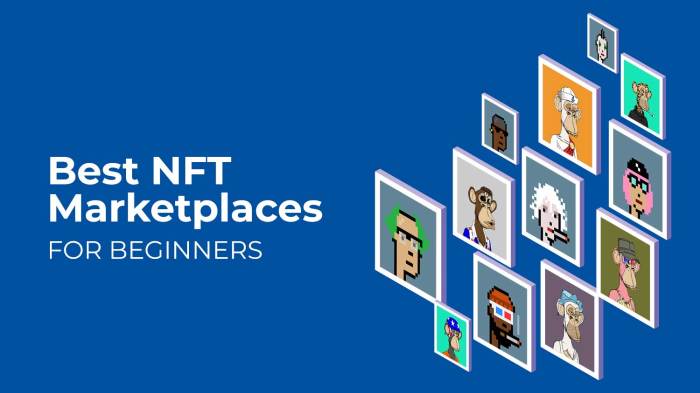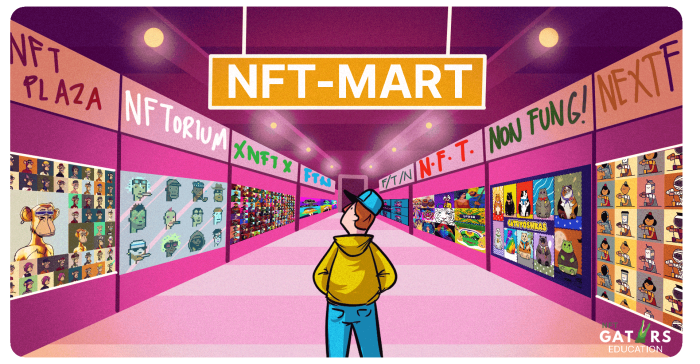NFT marketplaces have taken the digital world by storm, offering a unique way to buy, sell, and trade digital assets. From the rise in popularity to the different types available, let’s dive into the fascinating world of NFT marketplaces.
Overview of NFT Marketplaces
NFTs, or Non-Fungible Tokens, are unique digital assets that represent ownership of a specific item or piece of content, such as art, music, videos, or collectibles, using blockchain technology.
NFT marketplaces serve as online platforms where users can buy, sell, and trade NFTs. These marketplaces provide a secure and transparent environment for creators and collectors to engage in transactions, often utilizing cryptocurrency as a form of payment.
Role of NFT Marketplaces
NFT marketplaces play a crucial role in facilitating the exchange of digital assets, allowing creators to monetize their work and collectors to invest in unique pieces. These platforms enable artists to reach a global audience and establish a direct connection with their fans, bypassing traditional middlemen.
- NFT marketplaces offer a decentralized marketplace for creators to showcase and sell their digital creations.
- Users can explore a wide range of NFTs, from digital art and music to virtual real estate and gaming items.
- Smart contracts ensure the authenticity and ownership of NFTs, providing a secure and tamper-proof way to verify transactions.
With the rise of NFT marketplaces, artists have found new opportunities to monetize their work and engage with a global audience.
Popularity of NFT Marketplaces
In recent years, NFT marketplaces have gained significant traction, attracting both mainstream attention and investment from collectors and enthusiasts. The surge in popularity can be attributed to the following factors:
- Celebrity endorsements and high-profile sales have brought NFTs into the spotlight, drawing in a wider audience interested in digital collectibles.
- The scarcity and uniqueness of NFTs appeal to collectors looking for exclusive and one-of-a-kind assets to add to their portfolios.
- The integration of blockchain technology provides transparency and security, instilling trust in buyers and sellers participating in NFT transactions.
Types of NFT Marketplaces

When it comes to NFT marketplaces, there are two main types: centralized and decentralized. Each type has its own set of advantages and disadvantages, catering to different needs and preferences in the NFT space.
Centralized NFT Marketplaces
Centralized NFT marketplaces are platforms that are operated and managed by a single entity. Examples of centralized NFT marketplaces include OpenSea and Rarible. These platforms often offer a user-friendly interface and customer support, making it easier for users to navigate and engage in buying and selling NFTs. However, centralized marketplaces are susceptible to censorship and control by the platform owners, which goes against the decentralized nature of blockchain technology.
Decentralized NFT Marketplaces
On the other hand, decentralized NFT marketplaces operate on blockchain technology, allowing for peer-to-peer transactions without the need for intermediaries. Platforms like Mintable and Foundation fall under this category. Decentralized marketplaces provide greater transparency, security, and ownership of digital assets, as transactions are recorded on the blockchain. However, they may lack certain features present in centralized platforms, such as customer support and user-friendly interfaces.
Features of NFT Marketplaces

When it comes to NFT marketplaces, there are several key features that set them apart from traditional art markets and online platforms. These features include royalties, smart contracts, and ownership verification, which play a crucial role in the buying and selling of NFTs.
Royalties in NFT marketplaces ensure that creators receive a percentage of the resale value each time their work is sold. This incentivizes artists to continue creating and allows them to benefit from the increasing value of their art over time. Smart contracts, on the other hand, are self-executing contracts with the terms of the agreement directly written into code. They automate the sale and transfer of NFTs, ensuring that transactions are secure and transparent.
Ownership verification is another important feature of NFT marketplaces, as it allows buyers to verify the authenticity and ownership of the digital assets they are purchasing. This helps prevent fraud and ensures that buyers are getting what they pay for.
Unique Features of NFT Marketplaces
- NFT marketplaces like OpenSea offer gas-free transactions, making it more cost-effective for both buyers and sellers.
- Rarible allows creators to tokenize their social media posts, turning them into NFTs that can be bought and sold.
NFT Marketplace Trends
The world of NFT marketplaces is constantly evolving, with new trends shaping the landscape and driving innovation. Let’s take a closer look at some of the current trends influencing the NFT marketplace space.
Celebrity Endorsements Impact
Celebrity endorsements have become a powerful driving force behind the growth of NFT marketplaces. When a well-known figure or influencer promotes a specific NFT project or collection, it can significantly boost visibility and interest among their fan base. This heightened exposure often leads to increased demand and higher sales prices for NFTs associated with these endorsements.
Fractionalized Ownership
One emerging trend in the NFT marketplace is fractionalized ownership. This concept allows multiple investors to own a fraction of an NFT, enabling broader access to high-value assets that would otherwise be out of reach for individual buyers. Fractionalized ownership opens up new opportunities for collaboration and investment in the NFT space, democratizing access to digital collectibles and assets.
Gaming Integration
Another exciting trend in NFT marketplaces is the integration of NFTs with gaming ecosystems. By incorporating non-fungible tokens into gameplay, developers can offer unique in-game assets, characters, or virtual items that players can buy, sell, and trade as NFTs. This fusion of gaming and NFTs enhances the gaming experience, introduces new revenue streams for developers, and creates a vibrant marketplace for gamers and collectors alike.
Security and Legitimacy in NFT Marketplaces
When it comes to NFTs, security and legitimacy are crucial factors to consider. With the rise of digital assets and unique collectibles, ensuring a safe and trustworthy environment for transactions is essential.
explaining the importance of security measures in NFT transactions and the significance of verifying legitimacy in marketplaces.
Common Security Risks and Mitigation
- One common security risk in NFT marketplaces is the potential for scams and fraud. To mitigate this risk, users should always research the reputation of the marketplace and the seller before making a purchase.
- Another risk is the possibility of counterfeit or stolen NFTs. Users can protect themselves by verifying the authenticity of the NFT through blockchain records and ensuring that the marketplace has proper verification processes in place.
- Phishing attacks and malware are also prevalent risks in the digital space. Users should be cautious of unsolicited emails or messages asking for personal information and always use secure and reputable platforms for their transactions.
Tips for Legitimacy Verification
- Always verify the credentials of the NFT issuer and ensure they have a reputable background in the industry.
- Check for the NFT’s unique identifier on the blockchain to confirm its authenticity and ownership.
- Look for reviews and feedback from other users who have interacted with the marketplace or seller to gauge their trustworthiness.
- Avoid deals that seem too good to be true or prices that are significantly lower than market value, as they could be red flags for potential scams.